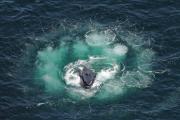Sea otters, dolphins, crows, elephants, octopuses, crocodiles—these animals, like humans, use tools for a variety of activities, from eating and drinking, to grooming and play, to combat and communication. But far fewer animals are known to manufacture and modify the tools, rather than simply using what they come across in their environment. And now, humpback whales are part of this much smaller group of “tool wielders.”
In Print: October 1, 2024





